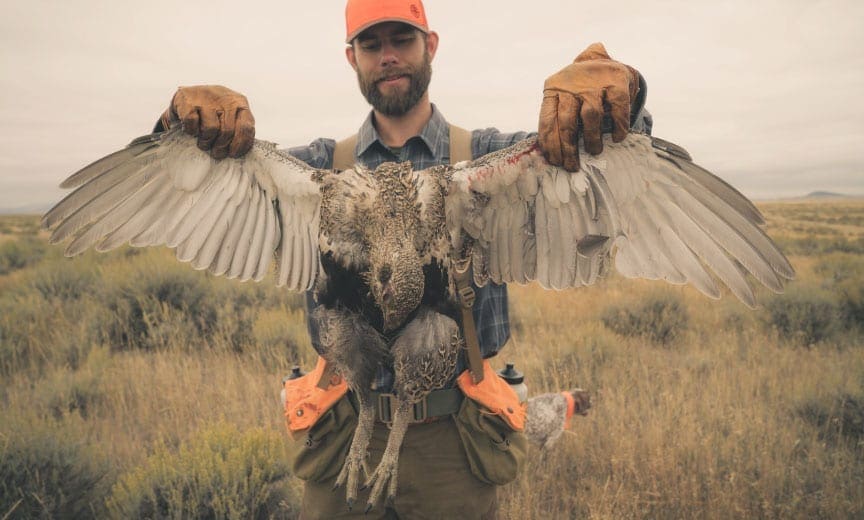Home » Hunting Rules, Licenses, and Seasons » Montana Bird Hunting for Pheasant, Huns, Sharp-tailed Grouse, and More
Montana Bird Hunting for Pheasant, Huns, Sharp-tailed Grouse, and More
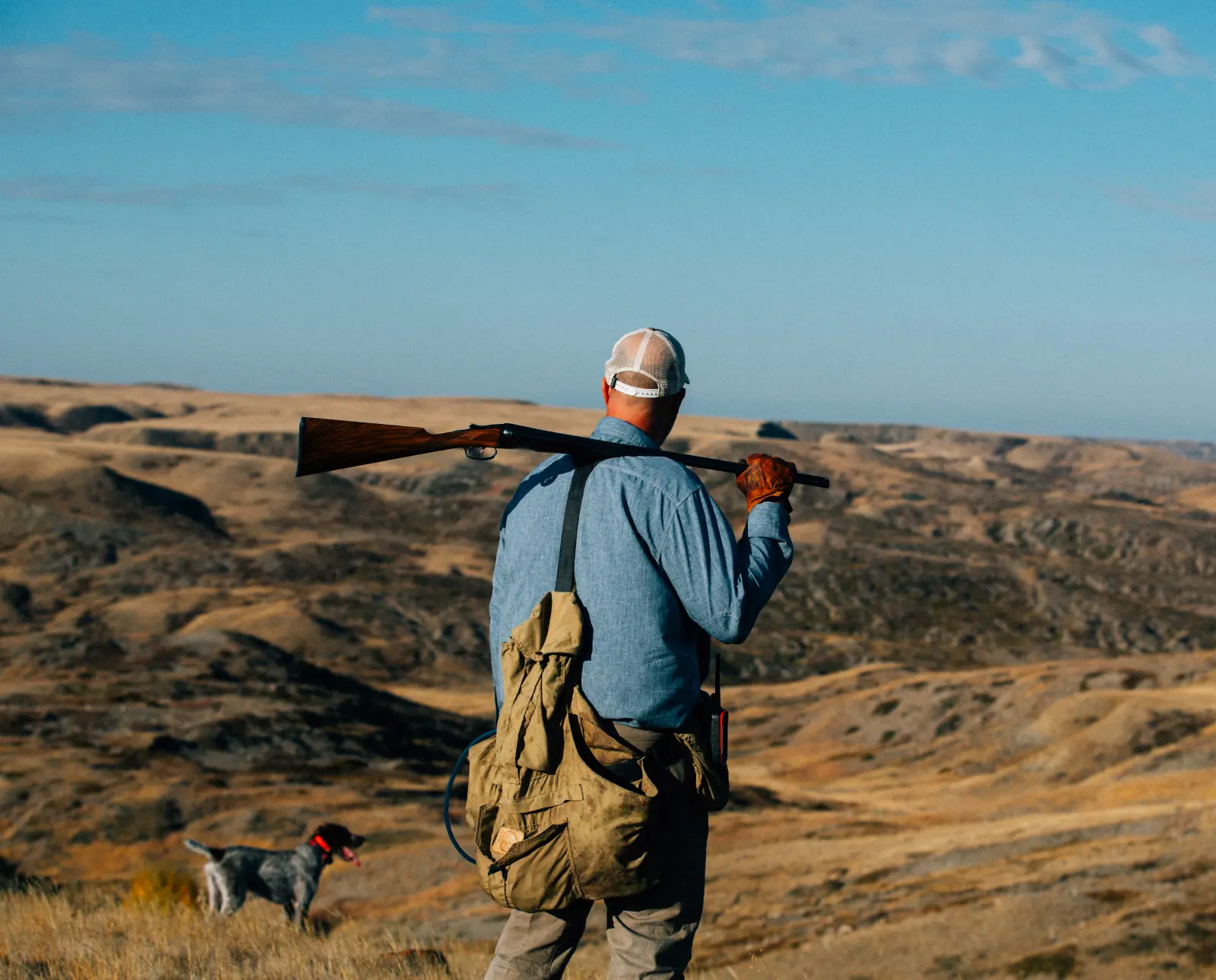
A.J. DeRosa, founder of Project Upland, is a New England…
Upland bird hunting under the big sky of Montana is a beautiful challenge with a lot of game bird variety, check out the latest season dates and impactful issues.
Before us stretched a vast sage steppe that seemed to extend forever beside the pale mountains on the horizon. For someone who grew up in the dense forests of New England, it was hard to imagine a bird—let alone many birds—living in this landscape. But with the laughter of sharp-tailed grouse as a large group burst up like popcorn in front of us, a Brittany continuing to reposition as more birds materialized, I was mesmerized by Montana.
At that moment in time, I was hunting sage grouse, and after shooting my first sharptail, I later took down a big old sage grouse bomber. When I spread its wings open, they were wider than my own arm span. This is just one of the many diverse opportunities in the Big Sky state. From forest grouse in the mountains to wild chukar and Huns, Montana offers incredible diversity and opportunity to bird hunters.
Starting September 1, both traveling hunters and locals alike can experience some of the best wingshooting in the country as they begin their season. As the fourth-largest state, Montana offers prairies, ranges, plateaus, valleys, lakes, and great plains. Around 33 million acres of that land are public, meaning a great deal of it is open for hunting.
Download: the 2024/25 Montana Upland Game Bird Guide
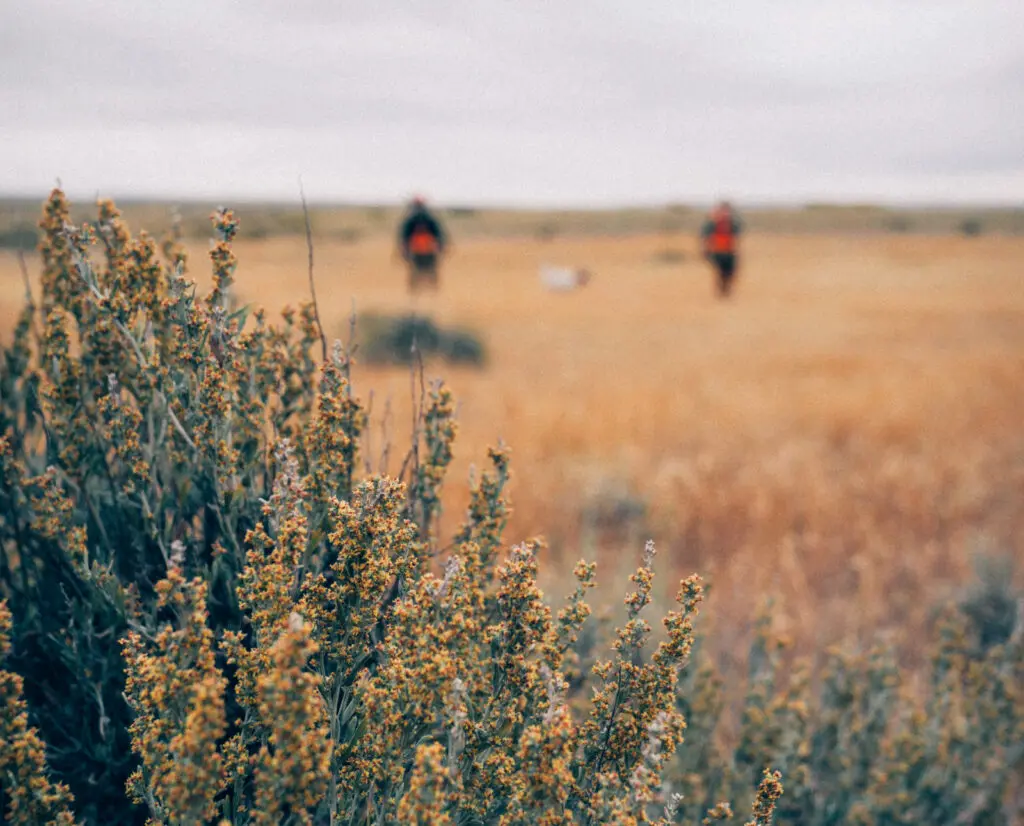
2024-25 Montana Upland Bird Hunting Seasons
| Species* | Season | Daily / Possession Limit | Notes |
| Dusky Grouse | Sep. 1, 2023 – Jan. 1, 2025 | 3 / 12 (combined “Mountain Grouse” species) | |
| Spruce Grouse | Sep. 1, 2023 – Jan. 1, 2025 | 3 / 12 (combined “Mountain Grouse” species) | |
| Ruffed Grouse | Sep. 1, 2023 – Jan. 1, 2025 | 3 / 12 (combined “Mountain Grouse” species) | |
| Sage Grouse | Sep. 1 – 30, 2024 | 2 / 4 | Closed west of the continental divide |
| Sharp-tailed Grouse | Sep. 1, 2024 – Jan. 1, 2025 | 4 / 16 | Closed west of the continental divide |
| Hungarian Partridge | Sep. 1, 2024 – Jan. 1, 2025 | 8 / 32 (Combined with Chukar) | Extended season to Jan 10 for a limited area; see regulations |
| Chukar | Sep. 1, 2024 – Jan. 1, 2025 | 8 / 32 (Combined with Huns) | Only in Carbon County |
| Ring-necked Pheasant | Oct 08, 2022 – Jan 1, 2023 | 3 / 9 | Roosters only |
| Ring-necked Pheasant (Youth) | Sept 24-25, 2022 | 3 / 6 | Roosters only |
| Ptarmigan | CLOSED | — | — |
| California and Gambel’s Quail | NO CLOSED SEASON | NO LIMIT | May be taken without license, season, or limit |
| Eurasian Collared Doves | NO CLOSED SEASON | NO LIMIT | May be taken without license, season, or limit |
| Mourning Dove | Sept 01 – Oct 30, 2022 | 15/45 | It is unlawful to shoot mourning doves resting on utility lines or fixtures adjacent to those lines. |
| Snipe | Sept 01 – Dec 16, 2022 | 8/24 |
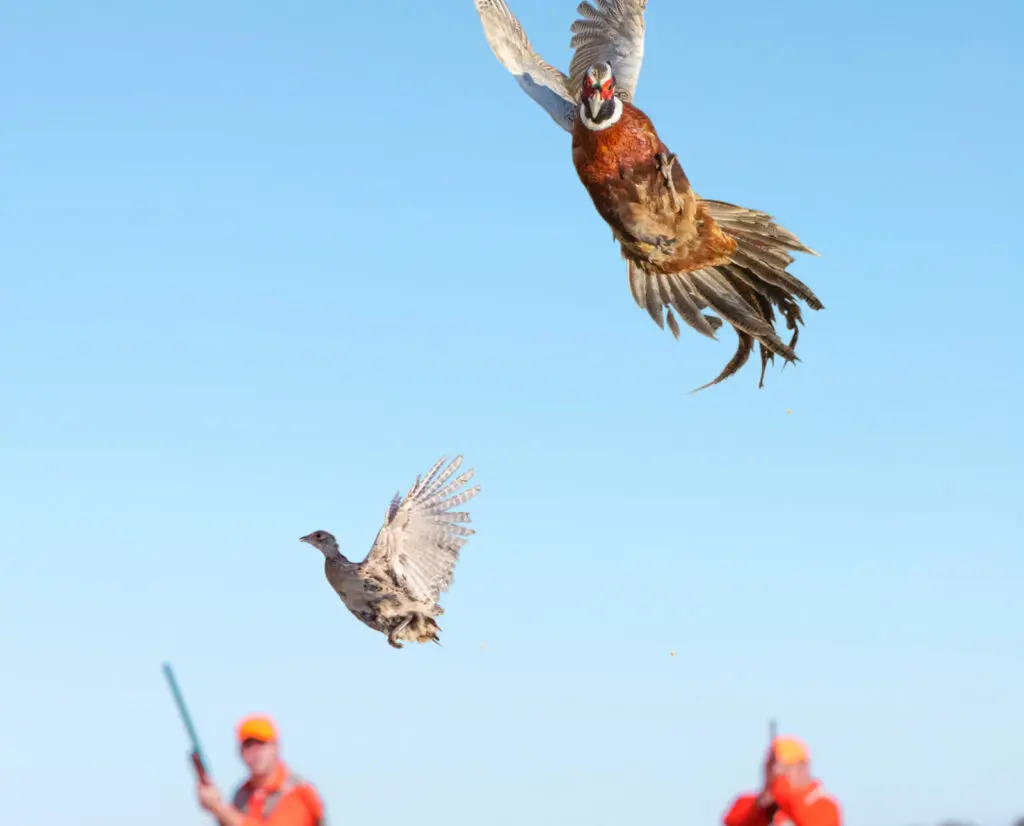
Ring-necked pheasant
Though they are not native to North America, ring-necked pheasant have been a national favorite of upland hunters for a long time. There is a general decline in the popularity of non-native species, specifically those supported by stocking programs. 2022 marked a controversial policy by Gov. Greg Gianforte’s administration that allocates $1 million for bird rearing pens at the state prison. The policy seeming to be deaf to the stakeholders want for such money to be allocated on habitat work rather than ineffective stocking programs with cost estimates of $150 per pheasant.
The season for ring-necked pheasant in Montana begins October 8th and ends January 1st with a daily bag limit of 3 roosters.
Mountain Grouse (Forest Grouse)
Montana is home to three species of forest grouse: ruffed, dusky (blue), and spruce (known as Franklin’s grouse in Montana). While most states refer to these as forest grouse, Montana provides a helpful clue on where to find them by calling them “Mountain Grouse” in their digest. While dusky grouse hunting is among the more popular pursuits in this category, Montana is one of the few states in the lower 48 where you can still hunt spruce grouse. The subspecies of ruffed grouse in Montana is Bonasa umbellus sabini, which offers wonderful opportunities and is known for behavior quite different from its eastern counterpart, Bonasa umbellus umbellus.
The season for mountain grouse begins September 1st and ends January 1st. There is a daily bag limit of 3 mountain grouse regardless of species.
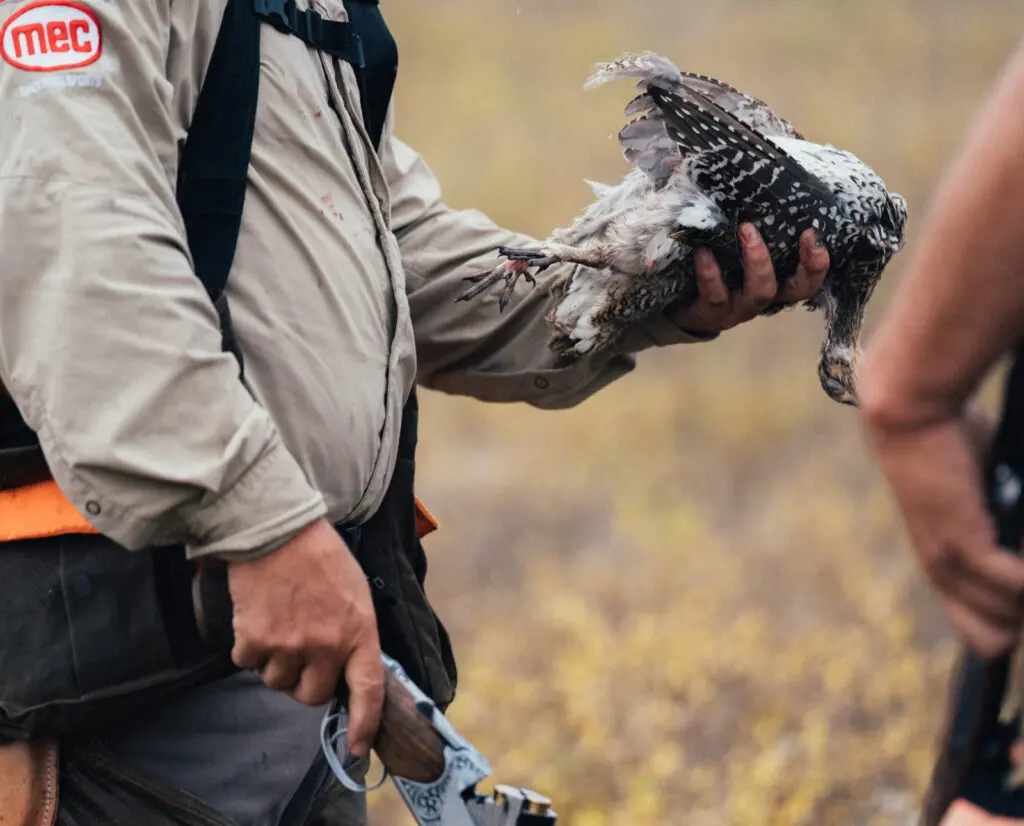
Sharp-tailed Grouse
The sharp-tailed grouse is likely the most popular native species to hunt in Montana. With populations often overlapping in areas where sage grouse and Hungarian partridge are found, the early September 1 opener attracts many hunters from the East, where bird hunting seasons start much later. Montana’s sharp-tailed grouse hunting opportunities are perhaps only rivaled by those in North Dakota.
The sharp-tailed grouse is considered a species of concern in Montana due to declining populations. Nevertheless, its range covers most of the state, except for the counties along the Montana-Idaho border. It is important to note that hunting for sharptails is not permitted west of the Continental Divide.
The season for sharp-tailed grouse begins September 1st and ends January 1st with a daily bag limit of 4 birds.
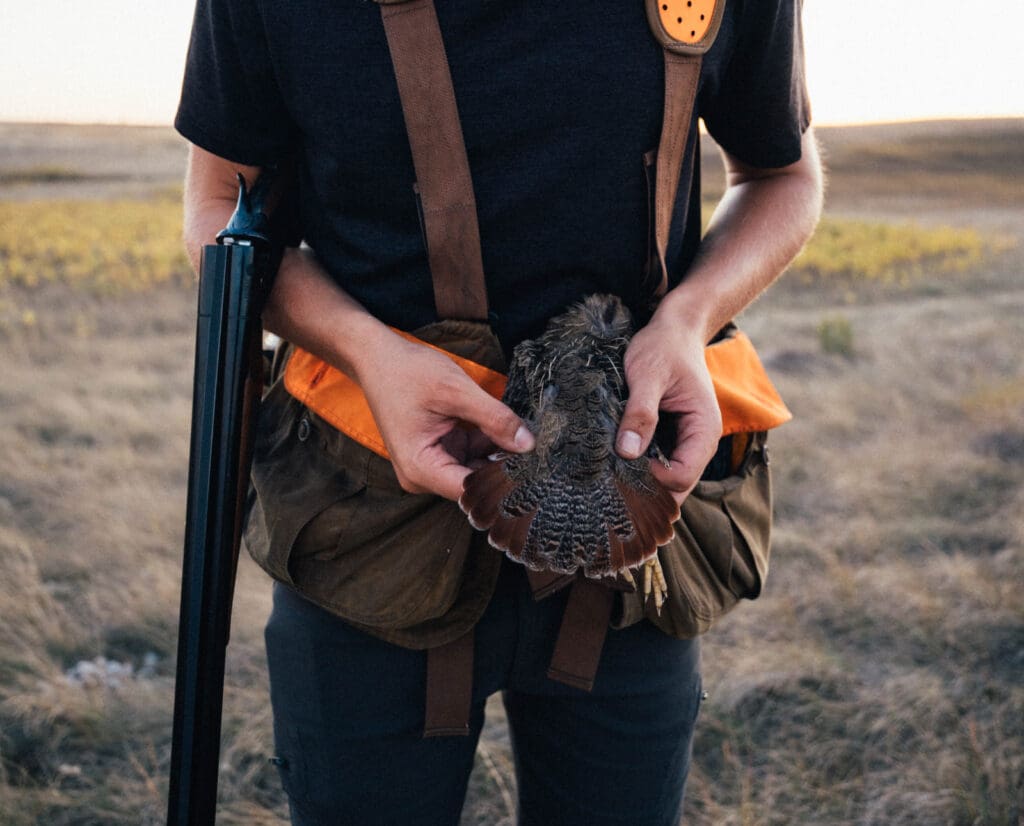
Hungarian Partridge
If you have never experienced a covey of Hungarian partridge rising before a pointing dog in open country, you don’t know what you’re missing. These non-native game birds were first introduced in the early 1900s and now occur in the wild. According to Montana Fish, Wildlife, and Parks, “Prime habitat in Montana is from the Rockies east and from Montana Highway 200 north, as well as in many mountain valleys in the western third of the state.”
Hungarian partridge have a high daily bag limit of 8 birds per day in Montana. However, hunters should be ethically conscious of how taking 8 birds from a single covey can impact the population in an area before filling their game bag. The season opens on September 1st and ends on January 1st.
Greater sage grouse
Sage grouse are the largest upland game bird in North America (if you do not consider the wild turkey as upland game), and Montana is one of the few states with stable sage grouse hunting opportunities. As their name implies, greater sage grouse typically inhabit landscapes dominated by sagebrush. The Montana Sage Grouse Habitat Conservation Program aims to preserve these natural habitats for this upland species. Central Montana and the counties east of the Continental Divide account for much of their range.
The season begins on September 1st and ends on September 30th, with a daily bag limit of 2 birds and a maximum possession limit of 4 birds.
Chukar
Chukar hunting opportunities exist in Montana and are worth the chase for those who love the challenge of these “devil birds,” including in parts of the iconic Hell’s Canyon. Also a non-native species, chukars were first introduced in 1933 and are originally native to Pakistan.
The season opens on September 1 and ends on January 1, with a daily bag limit of 8.
Other species for bird hunting in Montana
Montana offers dove hunting opportunities for mourning doves and Eurasian collared doves. Mourning dove season opens on September 1 and ends on October 30, with a daily bag limit of 15. Eurasian collared doves, which are invasive in Montana, have no closed season and do not require a license.
For other migratory birds that are not waterfowl, you can hunt snipe in Montana. Both mourning doves and snipe require a HIP permit but do not require the use of non-toxic shot.
The most unusual upland game bird hunting seasons in Montana are related to quail. California quail are considered a non-game species and can be hunted year-round. They are a delightful bird to hunt, offering one of the most unusual year-round seasons in the country for a North American quail. These quail can be found in abundance in some parts of the state, providing an exciting opportunity for both hunters and dogs.
Gambel’s quail fall under the same non-game designation, but as far as we know, no one has seen one in Montana recently. They are native to the Southwest, and how they came to be in Montana—or whether they still exist there at all—is somewhat of a mystery. If you happen to encounter a covey of Gambel’s quail, there is no limit, nor is there a need for a hunting license.
Upland bird licensing fees for Montana
| License | Resident | Non-resident |
| Base hunting license | $10 | $15 |
| Conservation fee | $8 (general) $4 (youth/senior) | $10 |
| Upland game bird | $7.50 (general) $3.75 (youth/senior) | $110 (general) $55 (youth) |
| 3-day upland game bird (not valid for sage grouse or opening week of pheasant) | — | $50 |
| Bird Dog Training License | $5 | $10 |
Hunter safety course and dog training for bird hunting in Montana
If you were born after January 1, 1985, you must complete a certified hunter education course before applying for a hunting license. For more information, check out the hunter education course. In 2015, Montana created the Apprentice Hunter Program, which allows anyone between the ages of 10 and 17 to hunt without completing a hunter education course. You will need to fill out a certificate form, which costs $5, and follow the requirements concerning mentors.
You may not train your dog for bird hunting in Montana within one mile of any designated game preserve, bird nesting area, or management area.
Related conservation and non-profit organizations for Montana bird hunting
Pheasants Forever
Quail Forever
North American Versatile Hunting Dog Association (NAVHDA)
Montana Sage Grouse Habitat Conservation Program
The bird hunting season dates, game bird species available, and other information is subject to change. The article may not reflect this. Please visit Montana, Fish, Wildlife & Parks for the most up to date information on bird hunting in Montana.
A.J. DeRosa, founder of Project Upland, is a New England native with over 35 years of hunting experience across three continents. His passion for upland birds and side-by-side shotguns has taken him around the world, uncovering the stories of people and places connected to the uplands. First published in 2004, he wrote The Urban Deer Complex in 2014 and soon discovered a love for filmmaking, which led to the award-winning Project Upland film series. A.J.'s dedication to wildlife drives his advocacy for conservation policy and habitat funding at both federal and state levels. He serves as Vice Chair of the New Hampshire Fish & Game Commission, giving back to his community. You can often find A.J. and his Wirehaired Pointing Griffon, Grim, hunting in the mountains of New England—or wherever the birds lead them.




